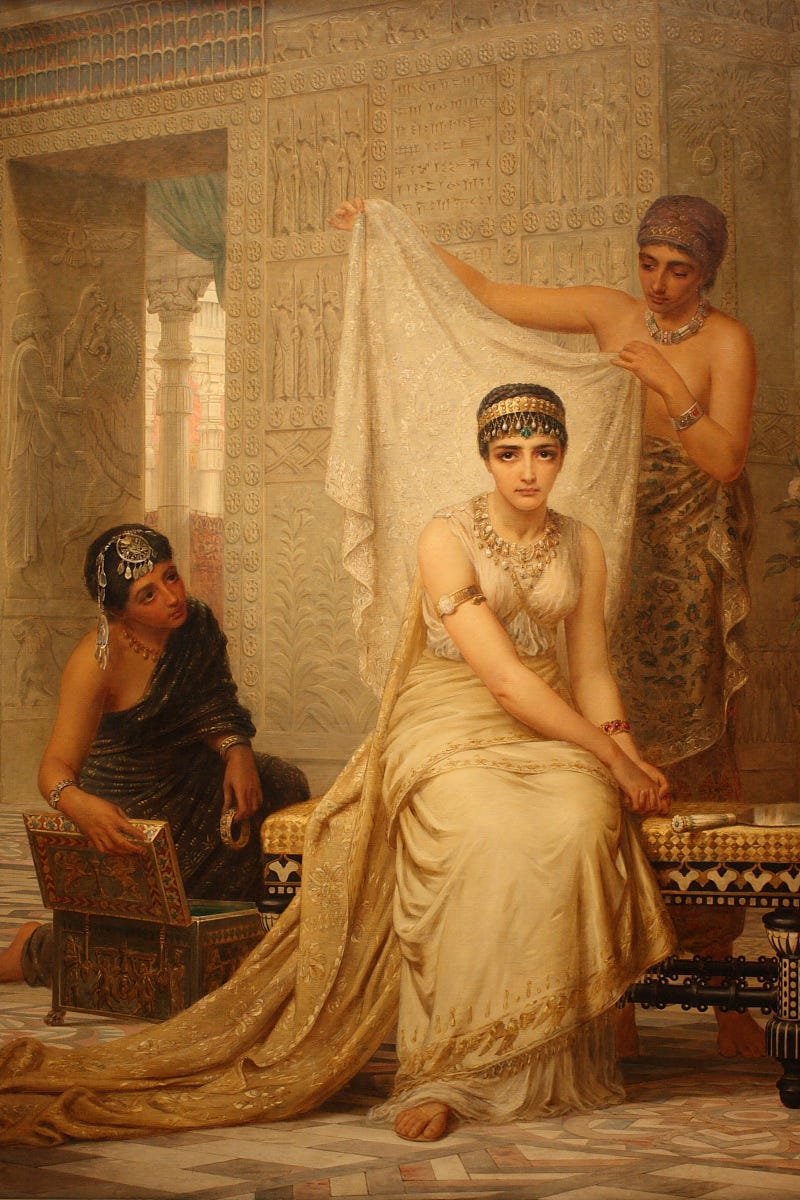Not too much, not too little: The Humility of Esther and the Arrogance of the King
As I continue my week's focus on Humility, I started a reading on the book of Esther. There are many ways to read this book, and a part of me loves the feminist reading of the text (see here), but for this study, I am focusing on the lessons on humility presented in the book and ignoring all other readings.
What is Humility?
“Occupy a rightful space, neither too much nor too little. Focus neither on your own virtues nor the faults of others.”
With this definition in mind, I am reading the text to see the lessons that I can draw out of the book.
Vashti, too much or too little humility
The story begins with King Ahasuerus and Queen Vashti throwing a grand banquet, the King for the men, and the Queen for the women. The King demanded that Vashti be brought before him, "But Queen Vashti refused to come at the king's command delivered by the eunuchs. Then the king became very angry and his wrath burned within him (Esther 1:12)."
The traditional view sees this refusal as an act of vanity or defiance, even vanity. The feminist view sees her as standing up to her drunkard husband. The question is, what really happened?
The problem is that this passage is a Rorschach Test, and everyone reads into it their own biases. I am probably doing that too, but I think I see an insight into humility in this passage.
What was Vashti's rightful place? The text says: "Queen Vashti also gave a banquet for the women in the palace which belonged to King Ahasuerus (Esther 1:9)." Her place was a master of the banquet, ensuring that everything went off without a hitch.
When the King called her, he didn't just ask her to come into the next room, but for her to change clothes and parade herself before the men so they would see her as superior to their wives, who she was suppose to make sure were having a good time.
Vashti's actions were perfectly humble. She did her duty rather than play to the arrogance and vanity of the king. She must have known that she was putting her life in danger through this action, but she knew it was better for her to do her duty than to satisfy the lust of the men.
The Arrogance of the King
The drunk King Ahasuerus then consults his wise men about what should be done. They feed his arrogance by saying that she wronged not only the king, but all the princes and guests at his party, ignoring that if she had come she would have shamed her own guests. They then stoked his wrath by saying that her actions would bring about the end of every marriage in the kingdom, and cause wives to hate their husbands. Does that sound familiar...
The idea that wounding the king's vanity would lead to the destruction of the kingdom's families is such an arrogance and insane level of hubris, that I cannot wrap my head around it. This is not the last time, his arrogance will come up in the story, but this shows how extreme the problem is.
As king, Ahasuerus expanded his sense of place to encompass the lives of every person in his kingdom. The very notion that if something so slight as Vashti doing her duty and not his will would corrupt every woman in the kingdom shows how he saw himself as the empire, and not just its head.
He so over stepped his rightful place that his arrogance pushes Vashti out and sends him on a search for new wife.
Enter Esther
Esther enters the story as a model of Humility. She fills her right space, not too much and not too little. Every time she is mentioned in chapter 2, she is named with her heritage. Like in the following passage, she is about to be brought before the king, and can bring with her anything she wants, so what does she do?
"Now when the turn of Esther, the daughter of Abihail the uncle of Mordecai who had taken her as his daughter, came to go in to the king, she did not request anything except what Hegai, the king's eunuch who was in charge of the women, advised. And Esther found favor in the eyes of all who saw her (Esther 2:15)."
She brings only what she was advised, and found favor with everyone. Her humility should not be contrasted with Vashti, but with the King. She knows if she is going to become next queen, she has to find favor with the King.
In my life, I need to learn from this example. Esther, like the king in the previous chapter, sought the advise of someone who knew what she needed to know and do. Unlike the King, Esther did not inflate her own self image, since she was very beautiful, but did what she need to do to become king.
While she remembered her heritage, she kept it secret since it wasn't something they needed to know. She filled the space available to her, and did not presume that her actions would effect more than just her and her immediate family.
The parallel between Esther and the King is a wonderful contrast of Humility and Arrogance.





